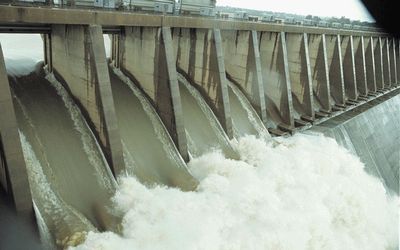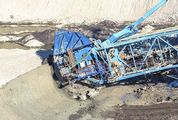AGRI Western Cape and the Chamber of Mines have criticised the Department of Water Affairs for allegedly dragging its feet in issuing integrated water-use licences, saying the process is riddled with inefficiencies.
Farmers apply for these licences to build dams for storing surplus water for dry periods, such as the one SA is experiencing at the moment. However, acquiring a licence is expensive and administratively cumbersome.
The integrated water-use licences are crucial for mining companies — they can be fined heavily if not in possession of one.
Department officials told Parliament last year that about 1,500 of the licence applications it had received had not been finalised.
When the new Water Act was enacted, nine catchment management agencies were to be set up to fast-track the licence applications. However, just two such agencies are in place: Breede-Gouritz in the Western Cape and Inkomati in Mpumalanga.
The Breede-Gouritz agency only issued its first licence in the Western Cape 14 years after the new Water Act was passed.
Agri Western Cape CEO Carl Opperman said: "The process takes too long, there is no feedback from the department and the licences take years to see the light of day."
A licence application must be accompanied by an environmental impact study that must be approved by the Department of Environmental Affairs, said Mr Opperman.
"A producer in the Western Cape has (typically) spent R600,000 on such a study that is not completed yet, money that he will lose should his application be rejected. Producers are thus taking huge financial risks to adapt to changes to keep the agricultural sector going.
"Except for the enormous costs, the process of environmental impact studies should also be accelerated urgently," Mr Opperman said, adding that dam-construction was capital-intensive, but producers were willing to go this route because they could no longer rely on river flow and rainfall to ensure food security.
Nikisi Lesufi, senior executive for health and the environment at the Chamber of Mines, said companies in the sector faced numerous delays when trying to acquire water-use licences.
"Historically, there has been a backlog in respect of granting integrated water-use licences for mining operations.
"There have been instances where the separation of approvals between the Department of Mineral Resources and the Department of Water and Sanitation has led to the duplication of requirements and created areas of potential conflict between departments and unnecessary delays," said Mr Lesufi.
Department of Water and Sanitation spokesman Mlimandlela Ndamase said: "The process for issuing a water-use licence is mapped out in our business process and we are fast-tracking all (licences) by dedicating more resources to the process."
Mr Ndamase cited assessing the availability of water in a catchment area as one of the department’s main challenges.
"For this, our department has to conduct a comprehensive determination of the water reserve. This process is lengthy and time-consuming," he said.
In 2014, the government started the roll-out of the One Environmental System, which was meant to streamline the issuing of water-use licences for miners. It included the process followed for environmental authorisations.
In terms of the new system, the Department of Mineral Resources issues environmental authorisations, while the Department of Water and Sanitation serves as the appeal authority.
Mr Lesufi said it was "too early to decipher" if the One Environmental System would resolve the conflicts or not.

DRY SPELL: Knowing whether the Vaal Dam has surplus water is of no help to farmers stymied by the government’s tardiness in issuing water-use licences allowing them to build dams to store surplus water. Picture: SOWETAN
AGRI Western Cape and the Chamber of Mines have criticised the Department of Water Affairs for allegedly dragging its feet in issuing integrated water-use licences, saying the process is riddled with inefficiencies.
Farmers apply for these licences to build dams for storing surplus water for dry periods, such as the one SA is experiencing at the moment. However, acquiring a licence is expensive and administratively cumbersome.
The integrated water-use licences are crucial for mining companies — they can be fined heavily if not in possession of one.
Department officials told Parliament last year that about 1,500 of the licence applications it had received had not been finalised.
When the new Water Act was enacted, nine catchment management agencies were to be set up to fast-track the licence applications. However, just two such agencies are in place: Breede-Gouritz in the Western Cape and Inkomati in Mpumalanga.
The Breede-Gouritz agency only issued its first licence in the Western Cape 14 years after the new Water Act was passed.
Agri Western Cape CEO Carl Opperman said: "The process takes too long, there is no feedback from the department and the licences take years to see the light of day."
A licence application must be accompanied by an environmental impact study that must be approved by the Department of Environmental Affairs, said Mr Opperman.
"A producer in the Western Cape has (typically) spent R600,000 on such a study that is not completed yet, money that he will lose should his application be rejected. Producers are thus taking huge financial risks to adapt to changes to keep the agricultural sector going.
"Except for the enormous costs, the process of environmental impact studies should also be accelerated urgently," Mr Opperman said, adding that dam-construction was capital-intensive, but producers were willing to go this route because they could no longer rely on river flow and rainfall to ensure food security.
Nikisi Lesufi, senior executive for health and the environment at the Chamber of Mines, said companies in the sector faced numerous delays when trying to acquire water-use licences.
"Historically, there has been a backlog in respect of granting integrated water-use licences for mining operations.
"There have been instances where the separation of approvals between the Department of Mineral Resources and the Department of Water and Sanitation has led to the duplication of requirements and created areas of potential conflict between departments and unnecessary delays," said Mr Lesufi.
Department of Water and Sanitation spokesman Mlimandlela Ndamase said: "The process for issuing a water-use licence is mapped out in our business process and we are fast-tracking all (licences) by dedicating more resources to the process."
Mr Ndamase cited assessing the availability of water in a catchment area as one of the department’s main challenges.
"For this, our department has to conduct a comprehensive determination of the water reserve. This process is lengthy and time-consuming," he said.
In 2014, the government started the roll-out of the One Environmental System, which was meant to streamline the issuing of water-use licences for miners. It included the process followed for environmental authorisations.
In terms of the new system, the Department of Mineral Resources issues environmental authorisations, while the Department of Water and Sanitation serves as the appeal authority.
Mr Lesufi said it was "too early to decipher" if the One Environmental System would resolve the conflicts or not.






















Change: -0.88%
Change: -1.16%
Change: -1.88%
Change: -0.02%
Change: -3.41%
Data supplied by Profile Data
Change: -1.60%
Change: 0.32%
Change: -0.88%
Change: 0.00%
Change: 0.44%
Data supplied by Profile Data
Change: 0.15%
Change: 0.17%
Change: 0.22%
Change: 0.14%
Change: 0.11%
Data supplied by Profile Data
Change: 0.59%
Change: 0.43%
Change: 0.39%
Change: 0.41%
Change: -0.52%
Data supplied by Profile Data